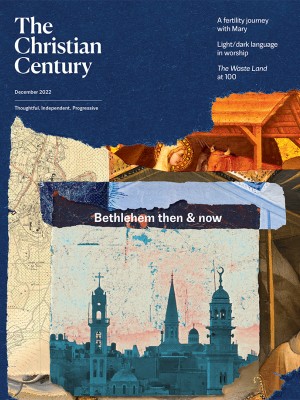December 24 & 25, Nativity (Luke 2:1-20)
God’s faithfulness shows up with wonder and surprise in a weary and heavy-laden world.
Christmas can toggle between being a delight and being a chore. Traditions may feel more precious after COVID isolation, but they also may seem futile. What difference does it make to decorate the tree, put up lights, wrap presents, send cards, host parties, and travel for family when the world is weary and heavy laden? Will any of it stop a military power from obliterating a nation? Keep another mass shooter from wreaking havoc on a community? Slow down climate change from destroying the planet’s most vulnerable? Prevent despots—or mere bureaucracies—from exerting damaging control?
Years ago, Paul Simon’s “7 O’Clock News/Silent Night” captured this perfectly. Against the backdrop of the Christmas carol “Silent Night,” the news drones on:
President Johnson originally proposed an outright ban covering discrimination by everyone for every type of housing, but it had no chance from the start, and everyone in Congress knew it. . . . In Washington the atmosphere was tense today as a special subcommittee of the House Committee on Un-American Activities continued its probe into anti–Vietnam war protests. Demonstrators were forcibly evicted from the hearings when they began chanting antiwar slogans. . . . That’s the seven o’clock edition of the news, goodnight.
Read our latest issue or browse back issues.
Perhaps that sounds familiar. Perhaps it has always been this way.
It is striking that the story of the Nativity opens not with the glory of God but with that all-too-familiar, ugly reality. This time, it is Emperor Augustus who is pulling the levers of power. He monetizes his authority by ensuring the highest tax grab possible. His decree requires that every single person, even the poorest of the poor, travel back to whatever God-forsaken place their family is from and register.
Mary and Joseph have to schlep 90 miles—oh, and she is nine months pregnant. Such a safe and comfortable time to travel. To the middle of nowhere. To a town where all the rooms are full. Lucky them—Mary gets to give birth in a stable. The contrast between the power of Emperor Augustus and the powerlessness of Joseph and Mary could not be more stark.
One might expect that the birth of the Messiah would have a more pleasant beginning. (Merry Christmas! Ho, ho, ho!) Or at least one where it looks like God is in charge, instead of some narcissistic autocrat.
It is only when the scene changes that the mood shifts . . . even darker. A bunch of shepherds—also very low on the economic totem pole—are terrified by the blazing light of an extraterrestrial visitation. It is not exactly comforting. But it is the start of God’s interference in the absurdly woeful world.
The contrast could not be more stark. Messages like “Do not be afraid,” “Good news,” and “Great joy” are not what people are accustomed to hearing—especially when they never know what the emperor’s next missive might demand; when they cannot predict when his army might descend on them; when they do not pretend to have security, safety, or sustenance.
And if the point were not clear enough, God brings it home when a host—an army—of angels swarm into the sky. “You think you’re in this alone?” God laughs. “Just try me.” No earthly power dares to compete with God’s glory.
Even then, mere promises are not enough. The shepherds go to Bethlehem to confirm what they have been told. The baby’s birth is just a sign—not the completion—of God’s promise to them. So far, so good. As for Mary, even she still needs to “turn things over” in her heart.
“The contrast . . . between the angelic panoply and the earthly reality is sharp,” writes Luke Timothy Johnson in his Luke commentary. So much so that even Mary needs to ponder these things in her heart. There is no obvious evidence of God’s glory in the circumstances of Jesus’ birth. But it is precisely when the news is bleak, when there is reason to count our own faith as absurd, that God’s faithfulness shows up, in wonder and surprise.





